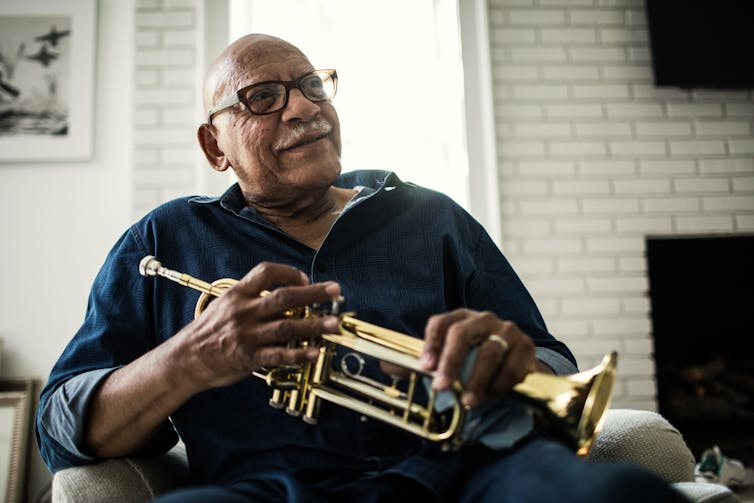Out with the old: Coronavirus highlights why we need new names for aging
- Written by Caroline Cicero, Instructional Associate Professor of Gerontology , University of Southern California
Although largely unnoticed by mainstream media, something significant has happened with the rise of COVID-19: the marginalization of older Americans. Scorn for elders is now on full display. Some blame them for the shelter-in-place guidelines. Some even say they should be offered up[1] as a sacrifice for the good of the country.
But the coronavirus affects everyone. It’s true that hospitalization and mortality rates increase with age, but a March report by the Centers for Disease Control and Prevention[2] shows young adults take up more ICU beds than the very old. This may evolve as the pandemic ensues. However, it highlights the potential issues in ageist assumptions. So why portray only older adults as vulnerable?
This is hardly the first time they have been diminished. Geezer, hag, crotchety, over-the-hill, coffin dodger, grumpy old man – these are stock phrases used to describe older adults, even by older adults themselves. One example: Donald Trump, age 73, commenting on[3] “Sleepy Joe” Biden, age 77.
There is a consequence. Words – positive, negative, supportive, dismissive – are powerful. They have tremendous impact. Our society no longer accepts the use of similarly degrading terms when identifying other demographic groups. Whether it’s gender, sex, race, religion, ethnicity – when people verbally discriminate in these domains, social norms are breached. Invariably, there’s a strong and loud response. Would we be so quick to victimize older adults if our language lifted them up rather than regularly put them down?
We don’t think so. We are professors of gerontology[4] at the University of Southern California. We ask anyone who considers themselves polite, socially aware and considerate of others to rethink the common, casual use of the stereotypical phrases that refer to age. Many people do value and respect the experience of older adults, of course; only by being aware of the implications of our word choices and behaviors can we start to adjust our prejudices.
 We don’t consider the consequences of ageism until we experience it.
Getty Images / MoMo Productions[5]
We don’t consider the consequences of ageism until we experience it.
Getty Images / MoMo Productions[5]
Discriminating against our future selves
Aging is something we will all experience, if we’re lucky. Yet ageism is arguably the last widely accepted form of social prejudice. Indeed, the World Health Organization[6] (WHO) believes ageism may be more pervasive than sexism or racism. Research clearly shows[7] negative attitudes about aging when you’re older can damage your health and well-being, even impact your mortality.
Whose lives are we cutting short? Our parents, grandparents, the aging co-worker? And what makes this particular prejudice so pernicious: everyone will be exposed to it as they go through life.
Ageism is ingrained into American society. Advertising bombards us with it: greeting cards[8] and GIFs[9], some that we send to family and loved ones, use blatantly ageist images and language. Prime time[10] and late night television[11] seek cheap laughs with skits that emphasize frailty, confusion, and memory problems. Many theatrical movies do much the same (“Bad Grandpa[12]” is one). The writers and performers, out to entertain young audiences, gain fame at the expense of “those unappealing others.”
Because ageist words have so easily slipped into the vernacular, they shape our attitudes toward older people. This is reinforced every time we re-experience these attitudes in the media. Maybe when we’re young or even middle-aged, we tend not to notice. But when our hair turns gray, when wrinkles appear deeper and eyesight noticeably deteriorates, we begin to understand. We start to notice the stereotypes. Now, the joke is on us.
 It’s not easy fighting ageism when it’s promoted in the media.
Getty Images / Justin Paget[13]
It’s not easy fighting ageism when it’s promoted in the media.
Getty Images / Justin Paget[13]
Conforming to expectations
When we fully acknowledge our membership in the older population, we then take on the stereotypes[14] associated with them. This is a double whammy. Putting the stereotypes on display reinforces them to the rest of society. It further cements the prevailing attitude. And it reinforces our own negative perceptions about aging, something we then eventually transfer to ourselves[15].
The anti-aging market makes billions by encouraging these stereotypes. We are told to mask age-related changes: hair dye, implants, botox, topical creams, cosmetic surgery. When we buy these products and services, we feed a greedy business thriving on our insecurities.
So does it really matter? Do our negative references to older people do harm? Is it a big deal to assign value to an older person’s appearance? Well, in a word, yes. Discriminatory attitudes drown workforce composition and opportunity for everyone. Those over 50 find it hardest to reenter the workforce, whether following a planned or unplanned exit. Those workers are also more likely to face discrimination, particularly with promotions. An uneven playing field is created; the older workforce is deskilled. This means older people will earn less, save less, and have less money for retirement.
Words can motivate change for good or bad. Our lexicon can push us in the wrong direction. When we say someone “looks good for their age,” or register surprise that they’re still working, we consider it a compliment. But why not say they simply look good? Or acknowledge their position in the workforce without acknowledging their age?
Language has a deep and profound impact, yet we use it flippantly. Stereotyped words promote ageism, prioritize youth, and prevent us from making the changes needed in our communities as we all advance in years. Aging is not an insult or fuel for laughter; it’s an accomplishment worthy of words of praise. With lives and livelihoods at stake, let’s stop the name calling.
[You’re smart and curious about the world. So are The Conversation’s authors and editors. You can get our highlights each weekend[16].]
References
- ^ they should be offered up (www.usatoday.com)
- ^ report by the Centers for Disease Control and Prevention (www.cdc.gov)
- ^ commenting on (thehill.com)
- ^ professors of gerontology (gero.usc.edu)
- ^ Getty Images / MoMo Productions (www.gettyimages.com)
- ^ World Health Organization (www.who.int)
- ^ Research clearly shows (www.giaging.org)
- ^ greeting cards (www.etsy.com)
- ^ GIFs (tenor.com)
- ^ Prime time (assets.uscannenberg.org)
- ^ late night television (www.youtube.com)
- ^ Bad Grandpa (www.imdb.com)
- ^ Getty Images / Justin Paget (www.gettyimages.com)
- ^ take on the stereotypes (journals.sagepub.com)
- ^ eventually transfer to ourselves (www.apa.org)
- ^ You can get our highlights each weekend (theconversation.com)
Authors: Caroline Cicero, Instructional Associate Professor of Gerontology , University of Southern California

